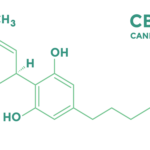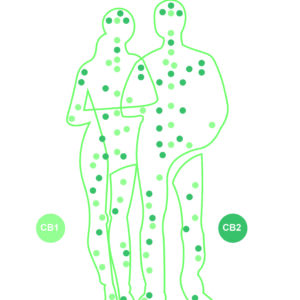If you’ve got CBD questions, we have answers! We believe that you should be educated on anything you put into your body, whether it be pharmaceutical or all-natural. Therefore, we have put together some basic information to help you understand what CBD is, how it works, and why people are using it. Here are expert answers to 13 common questions related to CBD and its use.
% of people who used CBD stopped using traditional medications and use cannabis instead.
% of people who used CBD found CBD products to be an extremely effective treatment
1. What is CBD?
CBD, short for cannabidiol, is a naturally occurring chemical compound found in the cannabis plant genus. Both hemp and marijuana are types of cannabis, and CBD can come from either. There are many other cannabinoids in addition to CBD; in fact, over 100 have been discovered thus far.

2. What is the endocannabinoid system?
To understand how CBD works, you must first understand the endocannabinoid system (ECS). This is a major bodily system (like the nervous or circulatory system) that was identified in the early 1990s. It is made up of cell receptors (endocannabinoids) that act as messengers giving your body specific directions on what to do.

3. What is the difference between marijuana and hemp?
While they are both cannabis plants, hemp does not have any psychoactive effects and will not give you a feeling of being “high.” Hemp is higher in CBD and lower in THC, which is the cannabinoid that can produce psychoactive effects. Marijuana is higher in THC and lower in CBD. All of the products that we carry are derived from the hemp plant, making them completely legal and devoid of any psychoactive side effects.
4. What do CBD products treat?
Endocannabinoids are located in many different areas in the body, including the brain, spinal cord, immune cells, gastrointestinal tract, and more. They tell the body when to get certain processes moving and when to stop. They also help keep the body in homeostasis or optimal balance. Therefore, the ECS is important in regulating many functions and feelings including:
– Anxiety
– Appetite/Hunger
– Depression
– Digestion
– Immune Function
– Memory
– Mood
– Motor Control
– Pain
– Pleasure & Reward
– Reproduction & Fertility
– Sleep
– Temperature Regulation
5. How does CBD work?
If your body does not produce enough endocannabinoids or cannot regulate them properly, you are more susceptible to illnesses that affect one or more of the bodily functions listed above. External sources of cannabinoids like CBD can help regulate your ECS. If your ECS is balanced, that can lead to improved health relating to those functions.
6. What are the effects of CBD?
CBD works on the endocannabinoid system. It relaxes the body, which can result in more restful sleep, less inflammation, and less pain. Everyone experiences it differently, though, so the impact of CBD will vary from person to person.
7. Does CBD oil get you high?
CBD is not a psychoactive compound. The CBD oil we sell at Mullaney’s is derived from hemp, a plant that does not produce enough TCH (the intoxicating cannabinoid in marijuana) to result in any sort of “high.” Users should always check to make sure that their CBD products have a THC content of 0.3% or less. All CBD products should have a published purity test. Before you try a new product, always do your research first!
8. Is CBD oil a drug?
Technically, CBD is a drug, as are over-the-counter medications like ibuprofen and aspirin. Pure CBD products will not cause you to fail a drug test since the TCH content is not nearly enough to cause any sort of intoxication. Make sure to only take the recommended amount of CBD oil.
9. What are the benefits of CBD?
The benefits of CBD may include improved sleep, decreased inflammation, decreased pain (especially for those suffering from chronic pain), and improved depression and anxiety. If you’re interested in trying CBD, make sure to talk to your doctor first. This is especially important if you are taking another medication.
10. What medications should not be taken with CBD?
CBD can interfere with some medications. Read more below to learn which medications you should avoid taking while also taking CBD products.
Warfarin
Taking warfarin and CBD together may increase the risk of bleeding. Even minor changes to the body’s equilibrium can increase the risk of bleeding and thrombosis due to the drug’s narrow therapeutic window.
Theophylline
Theophylline is used to treat asthma. By smoking, the increased CBD levels may speed up the metabolic clearance of this drug. (Please note: Mullaney’s does not recommend smoking.)
Clobazam
This medication is used to treat seizures. While CBD can be used in conjunction, do so only under the supervision of a doctor. CBD can increase the side effect of sedation in clobazam.
Valproate
Another seizure medication, CBD can increase liver enzymes when used in conjunction with valproate. This may cause liver injury.
11. Can people overdose on CBD?
There are currently no reports of a CBD overdose in humans. Studies have shown that CBD is well-tolerated within the human body, and no CBD allergies have been reported yet either. However, people should always take only the amount recommended by their doctor or stick to the serving size on the packaging.
12. Can pets take CBD oil?
CBD can be safe for animals. However, always consult the animal’s vet prior to using any CBD products. The dosing is different for pets compared to human dosage, and THC is toxic to animals. Therefore, always buy a quality CBD product with a company that will provide a certificate of analysis.
13. Can animals overdose on CBD?
No, animals cannot overdose on CBD. However, they can overdose on THC. Therefore, it is very important to buy a quality CBD product with a company that will provide a certificate of analysis.
If you still have CBD questions you need answered, contact us to speak with one of our pharmacists.



